高二英语 情态动词练习
高中英语情态动词形式单选题60题(含答案)
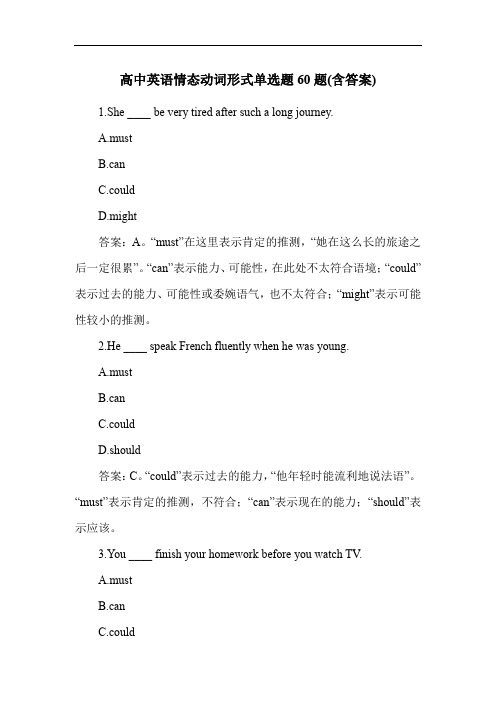
高中英语情态动词形式单选题60题(含答案)1.She ____ be very tired after such a long journey.A.mustB.canC.couldD.might答案:A。
“must”在这里表示肯定的推测,“她在这么长的旅途之后一定很累”。
“can”表示能力、可能性,在此处不太符合语境;“could”表示过去的能力、可能性或委婉语气,也不太符合;“might”表示可能性较小的推测。
2.He ____ speak French fluently when he was young.A.mustB.canC.couldD.should答案:C。
“could”表示过去的能力,“他年轻时能流利地说法语”。
“must”表示肯定的推测,不符合;“can”表示现在的能力;“should”表示应该。
3.You ____ finish your homework before you watch TV.A.mustB.canC.could答案:A。
“must”表示必须,“你必须在看电视之前完成作业”。
“can”表示能力、可能性;“could”表示过去的能力、可能性或委婉语气;“may”表示可能。
4.____ I borrow your pen?A.MustB.CanC.CouldD.Will答案:B。
“Can I...?”表示请求,“我能借你的笔吗?”“Must”表示必须,语气太强;“Could”用于更委婉的请求,但不如“Can”常用;“Will”表示将来。
5.She ____ have forgotten her keys. She's always so careful.A.can'tB.mustn'tC.shouldn'tD.needn't答案:A。
“can't”表示否定的推测,“她不可能忘了钥匙,她总是很细心”。
“mustn't”表示禁止;“shouldn't”表示不应该;“needn't”表示不必。
高二英语情态动词+have done结构用法单选题40题

高二英语情态动词+have done结构用法单选题40题1.He didn't answer my call. He must have been busy.A.must have beenB.can have beenC.should have beenD.could have been答案:A。
“must have been”表示对过去事情的肯定推测,他没接我电话,肯定是很忙。
“can have been”一般用于否定句和疑问句中表示推测;“should have been”表示本应该;“could have been”表示可能是,语气比“must have been”弱。
2.The ground is wet. It must have rained last night.A.must have rainedB.can have rainedC.should have rainedD.could have rained答案:A。
“must have rained”对过去事情的肯定推测,地面是湿的,肯定是昨晚下雨了。
“can have rained”一般用于否定句和疑问句中;“should have rained”表示本应该下雨;“could have rained”表示可能下雨,语气比“must have rained”弱。
3.She looks very tired. She must have worked hard yesterday.A.must have workedB.can have workedC.should have workedD.could have worked答案:A。
“must have worked”对过去事情的肯定推测,她看起来很累,肯定是昨天努力工作了。
“can have worked”一般用于否定句和疑问句中;“should have worked”表示本应该工作;“could have worked”表示可能工作,语气比“must have rained”弱。
(英语)高二英语情态动词题20套(带答案)

(英语)高二英语情态动词题20套(带答案)一、单项选择情态动词1.It wasn’t right to me that such near neighbors not know one another.A.could B.wouldC.should D.might【答案】C【解析】【详解】考查情态动词。
句意:对我来说,很不正常,如此近的邻居居然不认识。
A. could可能,能够;B. would将;C. should竟然;D. might可能,也许。
should 作为情态动词,可以用来表示意外、惊喜或者在说话人看来是不可思议的,常常译为"竟会"、"居然",住的这么近的邻居居然不认识。
表示意外,所以答案选C。
【点睛】should的用法1、should 作为情态动词,通常用来表示现在或将来的责任或义务,译作“应该”、“应当”,这时它可以和 ought to, be supposed to 互换使用.例如:You should (= ought to ) tell your mother about it at once.2、should 作为情态动词,可以用在条件状语从句中,表示语气较强的假设,译作“万一”、“竟然”,这时也可将 should 置于从句之首,即将 should 放在主语前面,而省略从属连词 if。
例如:If you should fail to come, ask Mrs Chen to work in your place. (= Should you fail to come, ask Mrs Chen to work in your place. )3、should 作为情态动词,可以表示谦逊、客气、委婉之意,译为“可……”、“倒……”。
例如:I should say that it would be better to try it again.4、should 作为情态动词,可以用来表示意外、惊喜或者在说话人看来是不可思议的.尤其在以 why, who, how 等开头的修辞疑问句或某些感叹句中常常译为“竟会”、“居然”。
高二英语情态动词推测用法练习题30题
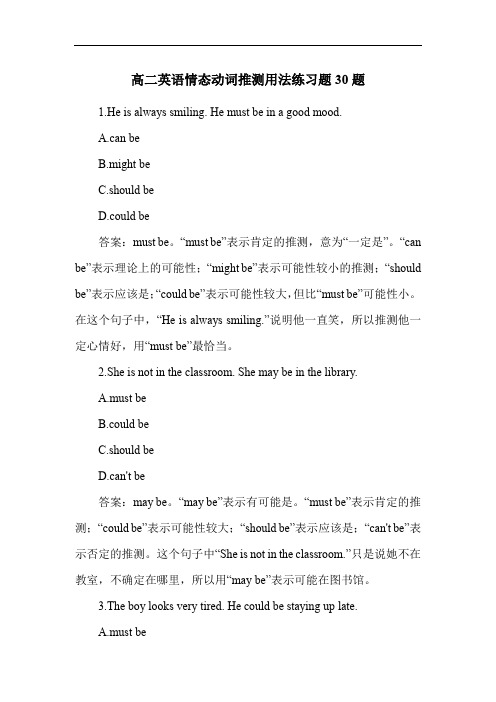
高二英语情态动词推测用法练习题30题1.He is always smiling. He must be in a good mood.A.can beB.might beC.should beD.could be答案:must be。
“must be”表示肯定的推测,意为“一定是”。
“can be”表示理论上的可能性;“might be”表示可能性较小的推测;“should be”表示应该是;“could be”表示可能性较大,但比“must be”可能性小。
在这个句子中,“He is always smiling.”说明他一直笑,所以推测他一定心情好,用“must be”最恰当。
2.She is not in the classroom. She may be in the library.A.must beB.could beC.should beD.can't be答案:may be。
“may be”表示有可能是。
“must be”表示肯定的推测;“could be”表示可能性较大;“should be”表示应该是;“can't be”表示否定的推测。
这个句子中“She is not in the classroom.”只是说她不在教室,不确定在哪里,所以用“may be”表示可能在图书馆。
3.The boy looks very tired. He could be staying up late.A.must beB.might beC.should beD.can't be答案:could be。
“could be”表示可能性较大的推测。
“must be”表示肯定的推测;“might be”表示可能性较小;“should be”表示应该是;“can't be”表示否定的推测。
这里“The boy looks very tired.”只是看起来累,所以用“could be”表示可能熬夜了。
【英语】高二英语情态动词题20套(带答案)含解析

【英语】高二英语情态动词题20套(带答案)含解析一、单项选择情态动词1.No student ________ go out of school to have lunch without permission of the headteacher. A.might B.mustC.shall D.could【答案】C【解析】【详解】考查情态动词。
句意:未经校长允许,任何学生不得离开学校去吃午饭。
might可能;must一定,必须;shall会,将;could能够。
本句是一条禁令。
shall用于肯定句并且主语是第一、三人称时,表示允诺,警告,劝告等语气。
故选C。
2.You ________ give me a lift. I want to walk home for exercise.A.needn’t B.couldn’t C.can’t D.mustn’t【答案】A【解析】【详解】考查情态动词。
句意:你不必让我搭车。
我想步行回家锻炼身体。
A. needn’t不必;B. couldn’t不能;C. can’t不会;D. mustn’t禁止,不允许。
根据I want to walk home for exercise.可知,你不必让我搭车。
故选A。
考点:考查情态动词3.While it wasn’t the goal of the trip, I was rewarded with fresh insights, ones that ________ to me during the regular course of business.A.might never happen B.could never have happenedC.should not happen D.needn’t have happened【答案】B【解析】【详解】考查虚拟语气。
句意:虽然这并不是这次旅行的目的,但我得到了一些新的领悟,那些领悟在我的日常生活中是本不可能发生的。
2024年高二英语情态动词need和dare辨析练习题40题

2024年高二英语情态动词need和dare辨析单选题40题1.You needn't hand in your homework today. It's optional.needn'tmustn'tshouldn'tcan't答案:needn't。
needn't 表示“不必”,在这句话中意思是今天交作业不是必须的,是可选的。
mustn't 表示“禁止”;shouldn't 表示“不应该”;can't 表示“不能”。
2.He dare not speak in public.doesn't daredaren'tneedn'tmustn't答案:daren't。
dare not 的缩写形式是daren't,表示“不敢”。
doesn't dare 后需接动词原形;needn't 表示“不必”;mustn't 表示“禁止”。
3.She need to study harder to pass the exam.needsneedn'tmustn'tcan't答案:needs。
she 是第三人称单数,need 作实义动词时后面跟动词不定式,且主语是第三人称单数时要用needs。
needn't 表示“不必”;mustn't 表示“禁止”;can't 表示“不能”。
4.We dare to challenge ourselves.don't darearen't dareneedn'tmustn't答案:dare to。
dare to do sth 表示“敢于做某事”。
don't dare 后需接动词原形;aren't dare 表述错误;needn't 表示“不必”;mustn't 表示“禁止”。
高中英语情态动词专题练习(含答案)
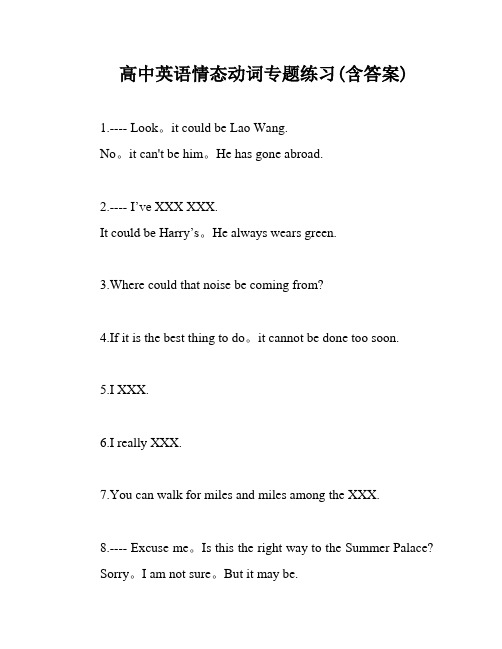
高中英语情态动词专题练习(含答案)1.---- Look。
it could be Lao Wang.No。
it can't be him。
He has gone abroad.2.---- I’ve XXX XXX.It could be Harry’s。
He always wears green.3.Where could that noise be coming from?4.If it is the best thing to do。
it cannot be done too soon.5.I XXX.6.I really XXX.7.You can walk for miles and miles among the XXX.8.---- Excuse me。
Is this the right way to the Summer Palace? Sorry。
I am not sure。
But it may be.13.XXX。
14.Since the XXX due to bad weather。
we should go by train。
15.The boss said to the secretary。
“If you work well。
you shall have a rise.”16.This is an XXX。
We must not let it pass。
17.“I hope Josh is OK at that summer camp。
He might be homesick”Don’t worry about him。
He will be having a great time.”18.If you could take a seat for a moment。
Mr。
Franks willbe with you soon。
19.As teenagers grow older。
【英语】高二英语情态动词专项训练及答案含解析
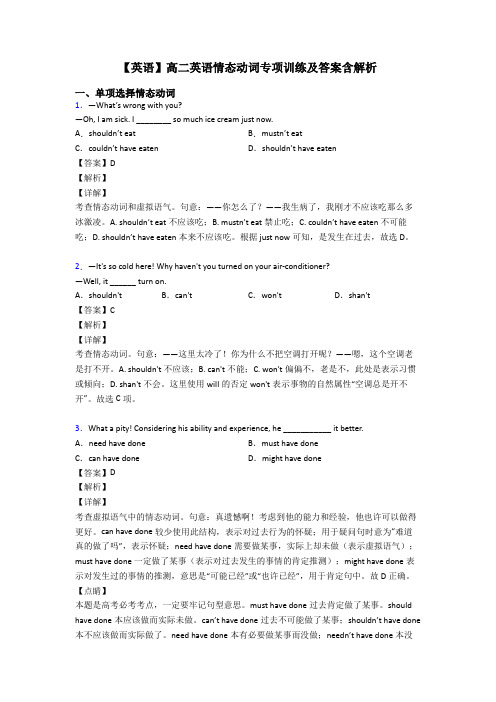
【英语】高二英语情态动词专项训练及答案含解析一、单项选择情态动词1.—What’s wrong with you?—Oh, I am sick. I ________ so much ice cream just now.A.shouldn’t eat B.mustn’t eatC.couldn’t have eaten D.shouldn’t have eaten【答案】D【解析】【详解】考查情态动词和虚拟语气。
句意:——你怎么了?——我生病了,我刚才不应该吃那么多冰激凌。
A. sho uldn’t eat不应该吃;B. mustn’t eat禁止吃;C. couldn’t have eaten不可能吃;D. shouldn’t have eaten本来不应该吃。
根据just now可知,是发生在过去,故选D。
2.—It's so cold here! Why haven't you turned on your air-conditioner?—Well, it ______ turn on.A.shouldn't B.can't C.won't D.shan't【答案】C【解析】【详解】考查情态动词。
句意:——这里太冷了!你为什么不把空调打开呢?——嗯,这个空调老是打不开。
A. shouldn't不应该;B. can't不能;C. won't偏偏不,老是不,此处是表示习惯或倾向;D. shan't不会。
这里使用will的否定won't表示事物的自然属性“空调总是开不开”。
故选C项。
3.What a pity! Considering his ability and experience, he ___________ it better.A.need have done B.must have doneC.can have done D.might have done【答案】D【解析】【详解】考查虚拟语气中的情态动词。
(英语)高二英语情态动词专项训练100(附答案)
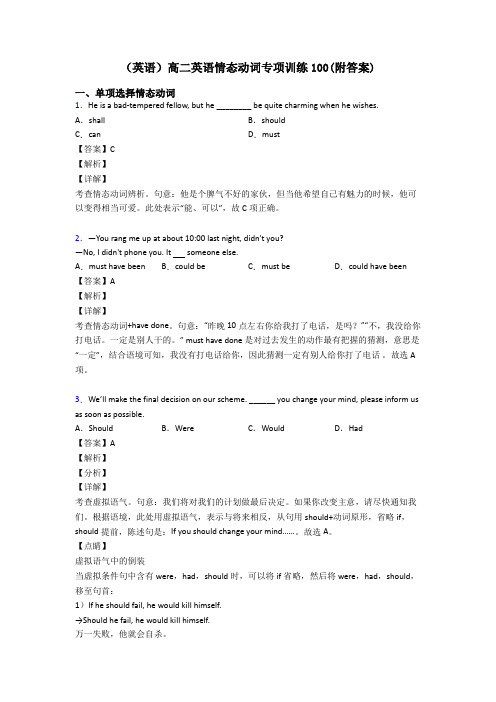
(英语)高二英语情态动词专项训练100(附答案)一、单项选择情态动词1.He is a bad-tempered fellow, but he ________ be quite charming when he wishes.A.shall B.shouldC.can D.must【答案】C【解析】【详解】考查情态动词辨析。
句意:他是个脾气不好的家伙,但当他希望自己有魅力的时候,他可以变得相当可爱。
此处表示“能、可以”,故C项正确。
2.—You rang me up at about 10:00 last night, didn't you?—No, I didn't phone you. It someone else.A.must have been B.could be C.must be D.could have been 【答案】A【解析】【详解】考查情态动词+have done。
句意:“昨晚10点左右你给我打了电话,是吗?”“不,我没给你打电话。
一定是别人干的。
” must have done 是对过去发生的动作最有把握的猜测,意思是“一定”,结合语境可知,我没有打电话给你,因此猜测一定有别人给你打了电话。
故选A 项。
3.We’ll make the final decision on our scheme. ______ you change your mind, please inform us as soon as possible.A.Should B.Were C.Would D.Had【答案】A【解析】【分析】【详解】考查虚拟语气。
句意:我们将对我们的计划做最后决定。
如果你改变主意,请尽快通知我们。
根据语境,此处用虚拟语气,表示与将来相反,从句用should+动词原形,省略if,should提前,陈述句是:If you should change your mind……。
高考英语情态动词推测运用练习题20题

高考英语情态动词推测运用练习题20题1.He is always reading books. He must be very interested in literature.A.mustB.mayC.mightD.could答案:A。
“must”在这里表示肯定的推测,语气最强。
他总是在读书,所以一定对文学很感兴趣。
“may”“might”“could”虽然也可以表示推测,但语气较弱,不符合这里的语境。
2.She has a lot of knowledge about art. She could be an art major.A.mustB.mayC.mightD.could答案:D。
“could”在这里表示比较委婉的推测。
她有很多关于艺术的知识,有可能是艺术专业的。
“must”语气太强硬,“may”“might”也可以表示推测,但不如“could”委婉。
3.The man is wearing a suit and tie. He might be going to a formal event.A.mustB.mayC.might答案:C。
“might”在这里表示比较弱的推测。
这个男人穿着西装打着领带,可能是要去一个正式的活动。
“must”语气太肯定,“may”“could”也可以表示推测,但“might”更符合语境。
4.The room is very clean. She may have cleaned it.A.mustB.mayC.mightD.could答案:B。
“may”在这里表示有可能的推测。
房间很干净,她有可能打扫了。
“must”语气太强硬,“might”“could”也可以表示推测,但“may”更符合语境。
5.There are many books on the desk. He could be a student.A.mustB.mayC.mightD.could答案:D。
高二英语情态动词题20套(带答案)

高二英语情态动词题20套(带答案)一、单项选择情态动词1.—What’s wrong with you?—Oh, I am sick. I ________ so much ice cream just now.A.shouldn’t eat B.mustn’t eatC.couldn’t have eaten D.shouldn’t have eaten【答案】D【解析】【详解】考查情态动词和虚拟语气。
句意:——你怎么了?——我生病了,我刚才不应该吃那么多冰激凌。
A. shouldn’t eat不应该吃;B. mustn’t eat禁止吃;C. couldn’t have eaten不可能吃;D. shouldn’t have eaten本来不应该吃。
根据just now可知,是发生在过去,故选D。
2.-–Mary knows the city quite well.--She______ well have been there before.A.need B.could C.should D.may【答案】D【解析】【分析】【详解】考查情态动词辨析。
句意:——Mary非常了解这个城市。
——她肯定以前在那里呆过。
may have done过去可能做过某事。
表示对过去的肯定猜测。
need have done本需要做某事却没做;could have done本可以做某事却没做;should have done本应该做某事却没做。
故选D。
3.—Did you attend the meeting for the experiment project yesterday?—Yes, but I don’t think I ____ because my director was there.A.need to have B.need to C.needed to D.need have【答案】D【解析】【分析】【详解】考查情态动词+have done。
高考英语情态动词单选题30题

高考英语情态动词单选题30题1.She be very tired after such a long journey. She has been on the road for over ten hours.A.mustB.canC.shouldD.need答案:A。
本题主要考查情态动词表示推测的用法。
“must”表示非常肯定的推测,根据后文她已经在路上走了十多个小时,所以一定很累。
“can”表示可能性,一般用于否定句或疑问句中表示推测。
“should”表示应该,通常表示一种责任或义务,不是推测。
“need”表示需要,不是推测的用法。
2.The weather forecast said it rain tomorrow, but it's not certain.A.mightB.mustC.shouldD.will答案:A。
“might”表示可能性较小的推测。
天气预报说明天可能下雨,但不确定,所以用“might”。
“must”表示非常肯定的推测,不符合语境。
“should”表示应该,不是推测的用法。
“will”表示将来会发生的事情,不是推测。
3.The door is locked. He be at home.B.mustn'tC.shouldn'tD.needn't答案:A。
“can't”表示否定的推测,意为“不可能”。
门是锁着的,所以他不可能在家。
“mustn't”表示禁止,不是推测的用法。
“shouldn't”表示不应该,不是推测的用法。
“needn't”表示不需要,不是推测的用法。
4.There is a lot of noise coming from the classroom. The students be having a party.A.mustB.canC.shouldD.would答案:A。
“must”表示非常肯定的推测。
高二英语情态动词推测用法单选题40题(带答案)
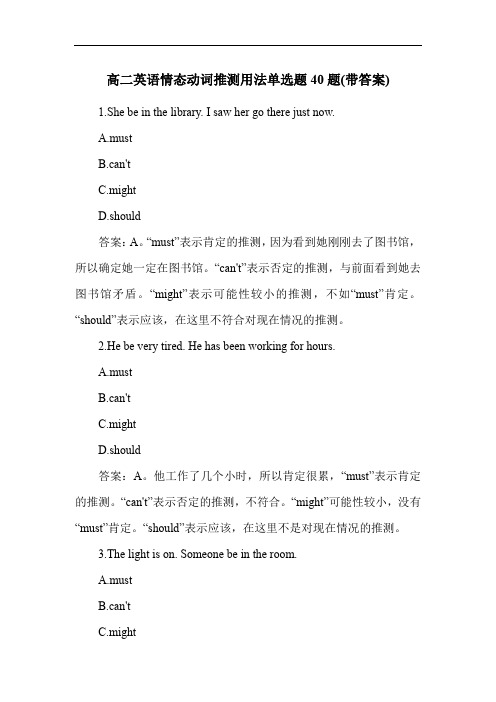
高二英语情态动词推测用法单选题40题(带答案)1.She be in the library. I saw her go there just now.A.mustB.can'tC.mightD.should答案:A。
“must”表示肯定的推测,因为看到她刚刚去了图书馆,所以确定她一定在图书馆。
“can't”表示否定的推测,与前面看到她去图书馆矛盾。
“might”表示可能性较小的推测,不如“must”肯定。
“should”表示应该,在这里不符合对现在情况的推测。
2.He be very tired. He has been working for hours.A.mustB.can'tC.mightD.should答案:A。
他工作了几个小时,所以肯定很累,“must”表示肯定的推测。
“can't”表示否定的推测,不符合。
“might”可能性较小,没有“must”肯定。
“should”表示应该,在这里不是对现在情况的推测。
3.The light is on. Someone be in the room.A.mustB.can'tC.mightD.should答案:A。
灯亮着,所以肯定有人在房间里,“must”表示肯定的推测。
“can't”表示否定的推测,与灯亮着矛盾。
“might”可能性较小,不如“must”肯定。
“should”表示应该,不是对现在情况的推测。
4.She be at home. I just called and no one answered.A.mustB.can'tC.mightD.should答案:B。
刚刚打电话没人接,所以肯定不在家,“can't”表示否定的推测。
“must”表示肯定的推测,不符合。
“might”可能性较小,这里根据打电话没人接可以确定不在家。
“should”表示应该,不是对现在情况的推测。
高二英语情态动词和虚拟语气单选题30题(带答案)
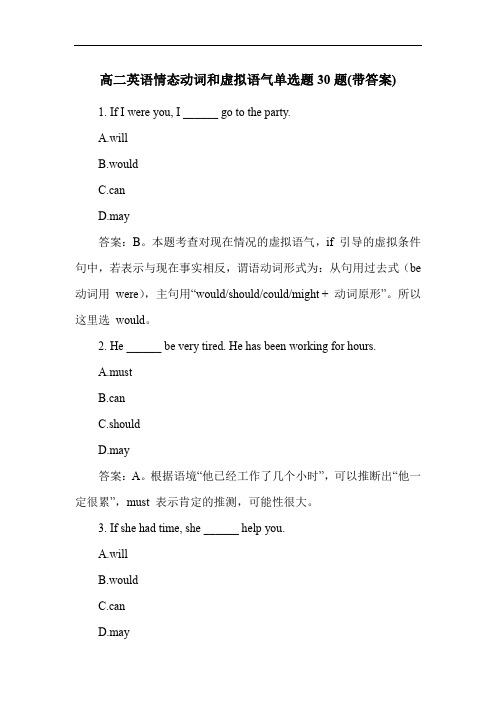
高二英语情态动词和虚拟语气单选题30题(带答案)1. If I were you, I ______ go to the party.A.willB.wouldC.canD.may答案:B。
本题考查对现在情况的虚拟语气,if 引导的虚拟条件句中,若表示与现在事实相反,谓语动词形式为:从句用过去式(be 动词用were),主句用“would/should/could/might + 动词原形”。
所以这里选would。
2. He ______ be very tired. He has been working for hours.A.mustB.canC.shouldD.may答案:A。
根据语境“他已经工作了几个小时”,可以推断出“他一定很累”,must 表示肯定的推测,可能性很大。
3. If she had time, she ______ help you.A.willB.wouldC.canD.may答案:B。
同第一题,对现在情况的虚拟语气,选would。
4. You ______ finish your homework before you watch TV.A.mustB.canC.shouldD.may答案:A。
must 表示“必须”,符合语境“在看电视之前必须完成作业”。
5. If I knew his number, I ______ call him.A.willB.wouldC.canD.may答案:B。
对现在情况的虚拟语气,选would。
6. He ______ know the answer. He looks so confident.A.mustB.canC.shouldD.may答案:A。
根据“他看起来很自信”,推断出“他一定知道答案”,must 表示肯定的推测。
7. If I were a bird, I ______ fly freely.A.willB.wouldC.canD.may答案:B。
高二英语情态动词特殊用法练习题40题
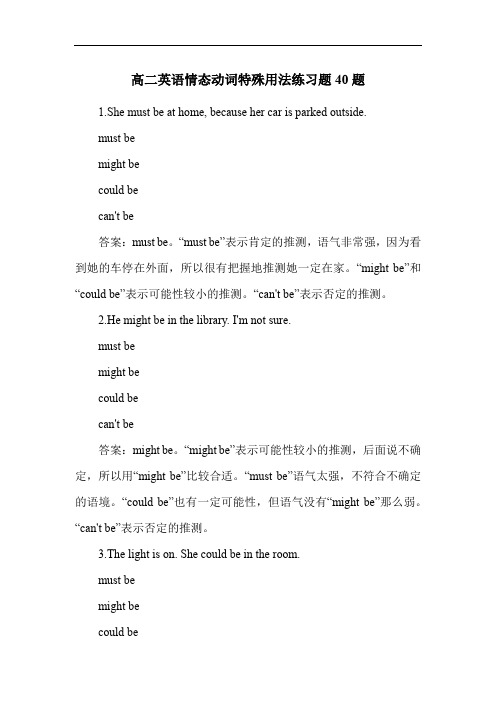
高二英语情态动词特殊用法练习题40题1.She must be at home, because her car is parked outside.must bemight becould becan't be答案:must be。
“must be”表示肯定的推测,语气非常强,因为看到她的车停在外面,所以很有把握地推测她一定在家。
“might be”和“could be”表示可能性较小的推测。
“can't be”表示否定的推测。
2.He might be in the library. I'm not sure.must bemight becould becan't be答案:might be。
“might be”表示可能性较小的推测,后面说不确定,所以用“might be”比较合适。
“must be”语气太强,不符合不确定的语境。
“could be”也有一定可能性,但语气没有“might be”那么弱。
“can't be”表示否定的推测。
3.The light is on. She could be in the room.must bemight becould becan't be答案:could be。
“could be”表示有一定的可能性,看到灯亮着,推测她可能在房间里,但不是很确定。
“must be”语气太强。
“might be”可能性比“could be”稍小。
“can't be”表示否定的推测。
4.There is no one in the classroom. They can't be having a class.must bemight becould becan't be答案:can't be。
“can't be”表示否定的推测,教室里没人,所以不可能在上课。
“must be”“might be”“could be”都是表示肯定或可能性的推测,不符合语境。
高二英语情态动词和虚拟语气练习题30题

高二英语情态动词和虚拟语气练习题30题1.If he were here now, he ______ be able to help us.A.mustB.mightC.shouldD.would答案:D。
“If he were here now”是对现在情况的虚拟,主句要用“would+动词原形”。
A 选项must 表示肯定的推测;B 选项might 表示可能性较小的推测;C 选项should 通常表示应该。
在这个虚拟语气的句子中,只有D 选项would 正确。
2.She ______ know the answer. She looks so confident.A.mustB.mightC.shouldD.could答案:A。
从“She looks so confident”可以看出她很可能知道答案,must 表示肯定的推测,可能性较大。
B 选项might 可能性较小;C 选项should 表示应该;D 选项could 表示能够或可能性。
所以 A 选项正确。
3.He ______ be at home. I just saw him leave.A.mustn'tB.can'tC.shouldn'tD.needn't答案:B。
“I just saw him leave”说明他肯定不在家,can't 表示否定的推测。
A 选项mustn't 表示禁止;C 选项shouldn't 表示不应该;D 选项needn't 表示不必。
所以B 选项正确。
4.They ______ have gone on vacation. Their house is empty.A.mustB.mightC.shouldD.could答案:A。
“Their house is empty”说明他们很可能去度假了,must 表示肯定的推测,可能性较大。
B 选项might 可能性较小;C 选项should 表示应该;D 选项could 表示能够或可能性。
高二英语情态动词用法练习题40题
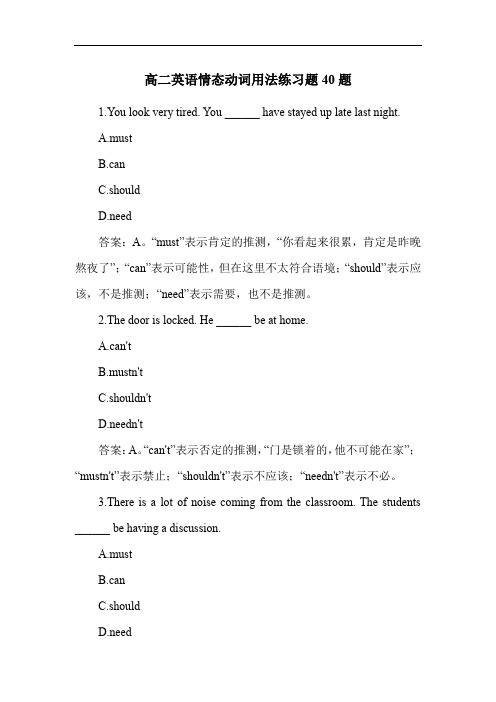
高二英语情态动词用法练习题40题1.You look very tired. You ______ have stayed up late last night.A.mustB.canC.shouldD.need答案:A。
“must”表示肯定的推测,“你看起来很累,肯定是昨晚熬夜了”;“can”表示可能性,但在这里不太符合语境;“should”表示应该,不是推测;“need”表示需要,也不是推测。
2.The door is locked. He ______ be at home.A.can'tB.mustn'tC.shouldn'tD.needn't答案:A。
“can't”表示否定的推测,“门是锁着的,他不可能在家”;“mustn't”表示禁止;“shouldn't”表示不应该;“needn't”表示不必。
3.There is a lot of noise coming from the classroom. The students ______ be having a discussion.A.mustB.canC.shouldD.need答案:A。
“must”表示肯定的推测,“有很多噪音从教室传来,学生们肯定在讨论”;“can”表示可能性,但语气不如“must”强;“should”表示应该,不是推测;“need”表示需要,也不是推测。
4.She is very good at English. She ______ have studied hard.A.mustB.canC.shouldD.need答案:A。
“must”表示肯定的推测,“她英语很好,肯定努力学习了”;“can”表示可能性,但不太符合语境;“should”表示应该,不是推测;“need”表示需要,也不是推测。
5.The book is not here. Someone ______ have taken it.A.mustB.canC.shouldD.need答案:A。
高二英语情态动词用法练习题40题
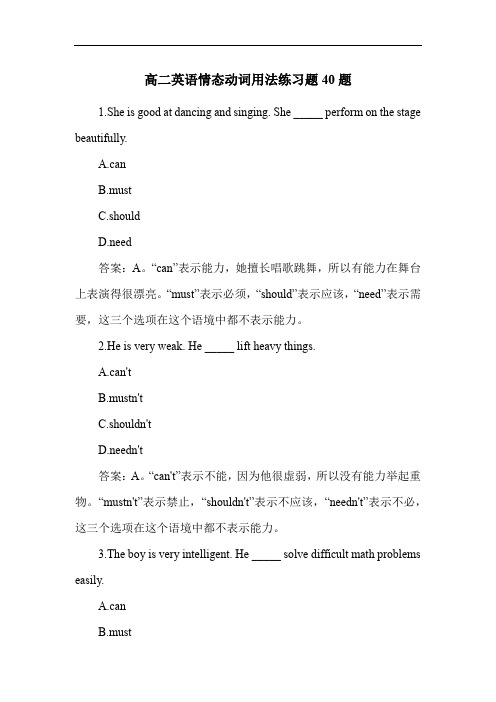
高二英语情态动词用法练习题40题1.She is good at dancing and singing. She _____ perform on the stage beautifully.A.canB.mustC.shouldD.need答案:A。
“can”表示能力,她擅长唱歌跳舞,所以有能力在舞台上表演得很漂亮。
“must”表示必须,“should”表示应该,“need”表示需要,这三个选项在这个语境中都不表示能力。
2.He is very weak. He _____ lift heavy things.A.can'tB.mustn'tC.shouldn'tD.needn't答案:A。
“can't”表示不能,因为他很虚弱,所以没有能力举起重物。
“mustn't”表示禁止,“shouldn't”表示不应该,“needn't”表示不必,这三个选项在这个语境中都不表示能力。
3.The boy is very intelligent. He _____ solve difficult math problems easily.A.canB.mustC.shouldD.need答案:A。
“can”表示能力,这个男孩很聪明,所以有能力轻松地解决难题。
“must”表示必须,“should”表示应该,“need”表示需要,这三个选项在这个语境中都不表示能力。
4.She has a lot of experience. She _____ handle difficult situations well.A.canB.mustC.shouldD.need答案:A。
“can”表示能力,她有很多经验,所以有能力很好地处理困难情况。
“must”表示必须,“should”表示应该,“need”表示需要,这三个选项在这个语境中都不表示能力。
5.He is a good swimmer. He _____ swim across the river.A.canB.mustC.shouldD.need答案:A。
高二英语情态动词试题
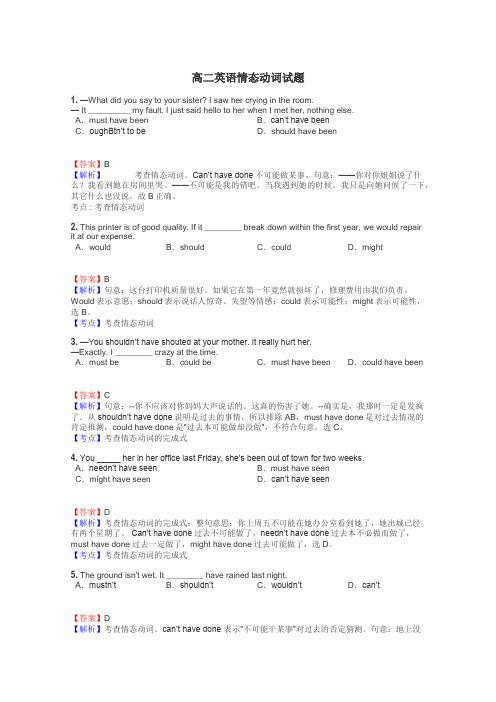
高二英语情态动词试题1.—What did you say to your sister? I saw her crying in the room.— It _________ my fault. I just said hello to her when I met her, nothing else.A.must have been B.can’t have beenC.oughBtn’t to be D.should have been【答案】B【解析】考查情态动词。
Can’t have done不可能做某事。
句意:——你对你姐姐说了什么?我看到她在房间里哭。
——不可能是我的错吧。
当我遇到她的时候,我只是向她问候了一下,其它什么也没说。
故B正确。
考点 : 考查情态动词2. This printer is of good quality. If it ________ break down within the first year, we would repairit at our expense.A.would B.should C.could D.might【答案】B【解析】句意:这台打印机质量很好。
如果它在第一年竟然就损坏了,修理费用由我们负责。
Would表示意愿;should表示说话人惊奇、失望等情感;could表示可能性;might表示可能性,选B。
【考点】考查情态动词3.—You shouldn’t have shouted at your mother. It really hurt her.—Exactly. I ________ crazy at the time.A.must be B.could be C.must have been D.could have been【答案】C【解析】句意:--你不应该对你妈妈大声说话的。
这真的伤害了她。
--确实是,我那时一定是发疯了。
高二英语情态动词专项训练及答案
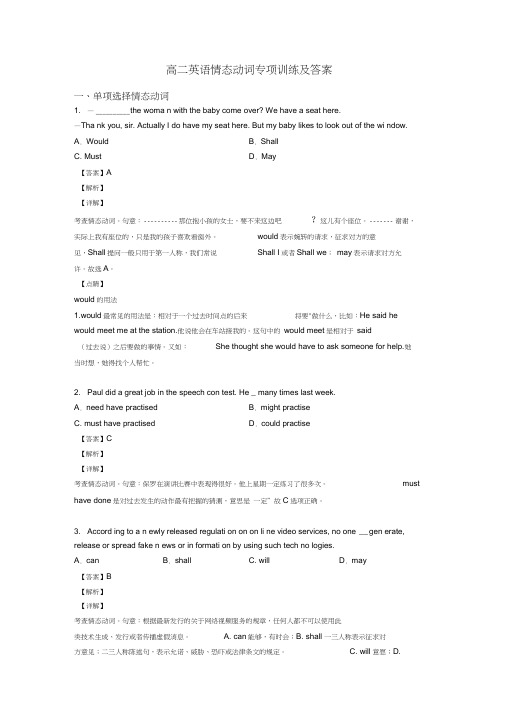
高二英语情态动词专项训练及答案一、单项选择情态动词1. —__________ t he woma n with the baby come over? We have a seat here.—Tha nk you, sir. Actually I do have my seat here. But my baby likes to look out of the wi ndow. A. Would B. ShallC. MustD. May【答案】A【解析】【详解】考查情态动词。
句意:---------- 那位抱小孩的女士,要不来这边吧?这儿有个座位。
------- 谢谢,实际上我有座位的,只是我的孩子喜欢看窗外。
would表示婉转的请求,征求对方的意见,Shall提问一般只用于第一人称,我们常说Shall I或者Shall we;may表示请求对方允许。
故选A。
【点睛】would的用法1.would最常见的用法是:相对于一个过去时间点的后来将要"做什么,比如:He said he would meet me at the station.他说他会在车站接我的。
这句中的would meet是相对于said(过去说)之后要做的事情。
又如:She thought she would have to ask someone for help.她当时想,她得找个人帮忙。
2. Paul did a great job in the speech con test. He _ many times last week.A. need have practisedB. might practiseC. must have practisedD. could practise【答案】C【解析】【详解】考查情态动词。
句意:保罗在演讲比赛中表现得很好。
他上星期一定练习了很多次。
must have done是对过去发生的动作最有把握的猜测,意思是一定”故C选项正确。
- 1、下载文档前请自行甄别文档内容的完整性,平台不提供额外的编辑、内容补充、找答案等附加服务。
- 2、"仅部分预览"的文档,不可在线预览部分如存在完整性等问题,可反馈申请退款(可完整预览的文档不适用该条件!)。
- 3、如文档侵犯您的权益,请联系客服反馈,我们会尽快为您处理(人工客服工作时间:9:00-18:30)。
高二英语情态动词练习情态动词是每年高考的必考语法项目之一。
在高考试题中的比重一直比较稳定,每年一至两个题。
但难度有逐年加大的趋势。
从命题形式上看,这一考点主要有如下几种形式:(1)听力部分选择题。
听句子,判断说话者的情感和语气,选出与所听到句子意义最接近的句子。
或听句子,判断说话者的情感和语气,选出最佳答语来补全对话。
(2)语言知识运用部分的单项选择题和完形填空题。
根据所给的句子或短文,进行判断,选出最佳的一个答案来补全句子。
(3)改错部分。
在短文的某一行中,可能出现错用、漏用或多用情态动词的情况。
Ⅰ.单项填空1.(2002全国高考题)—Is John coming by train?—He should,but he ________ not.He likes driving his car.A.mustB.canC.needD.may2.(2003北京春季高考题)—The room is so dirty.________ we clean it?—Of course.A.WillB.ShallC.WouldD.Do3.(2003上海春季高考题)My English-Chinese dictionary has disappeared.Who ________have taken it?A.shouldB.mustC.couldD.would4.(2002北京高考题)—I heard they went skiing in the mountains last winter.—It ________ true because there was little snow there.A.may not beB.won’t beC.couldn’t beD.mustn’t be5.(2002上海高考题)It has been announced that candidates ________ remain in theirseats until all the papers have been collected.A.canB.willC.mayD.shall6.—There were already five people in the car but they managed to take me as well. —It ________ a comfortable journey.A.can’t beB.shouldn’t beC.mustn’t have beenD.couldn’t have been7.—Did the train arrive in time?—No.It ________two hours ago.A.must have arriveB.ought to have arrivedC.must arriveD.ought to arrive8.—I can’t find my wallet.—You ________ it on the bus.A.must forgetB.must leaveC.must have forgottenD.must have left9.Such a businessman ________ be honest.He gets his money in a dishonest way.A.can’tB.mustn’t beC.may notD.shouldn’t10.Peter ________ come with us tonight,but he isn’t very sure yet.A.mustB.mayC.canD.will11.The girl used to be very interested in music,________ she?A.didn’teededn’t to12.The old woman ________ sit there for hours,recalling her good old days.A.wouldeded toD.could13.My watch is out of order.It needs ________.A.repairB.repairedC.repairingD.to repair14.It’s seven o’clock.Jack ________ be here at any moment.A.mustB.needC.shouldD.can15.It’s still early.You ________ hurry.A.mustn’tB.wouldn’tC.may notD.don’t have to16.—Do you think the flight is delayed?—It ________ be,especially in such weather.A.wouldB.shouldC.mightD.ought to17.Tom didn’t see her in the meeting room this morning.She ________ have spoken at the meeting.A.couldn’tB.mustn’tC.shouldn’tD.needn’t18.The light is still on.The student ________ to switch it off.A.must forgetB.must have forgottenC.might forgetD.may forget19.You must be a writer,________ you?A.can’tB.aren’tC.mustD.mustn’t20.You ought ________ for what you are unable to do.A.not to be punishedB.to not be punishedC.to not punishedD.not be punished21.If you had been more careful enough,you ________ have made so many mistakes.A.won’tB.mustn’tC.shouldn’tD.wouldn’t22.—I hear you’ve got a set of valuable Australian coins.________ I have a look? —Yes,certainly.A.MayB.DoC.ShallD.Should23.—Do you think I could borrow your dictionary?—________.A.Yes,you may borrowB.Yes,you couldC.Yes,go onD.Yes,help yourself24.The plant is dead.I ________ it more water.A.will giveB.would have givenC.must giveD.should have given25.You ________ return my umbrella now.You can keep it till next week if you like.A.can’tB.mustn’tC.needn’tD.may not26.Tom ought not to ________ me your secret,but he meant no harm.A.have toldB.tellC.be tellingD.having told27.He told Sally how to get there,but perhaps he ________ out for her.A.had to write itB.must have written itC.should have written itD.ought to write it28.Johnny,you ________ play with the knife; you ________ hurt yourself.A.won’t; can’tB.mustn’t; mayC.shouldn’t; mustD.can’t; shouldn’t29.It’s a fine day.Let’s go fishing,________?A.won’t weB.will weC.don’t weD.shall we30.Be sure to write to us,________ you?A.willB.aren’tC.canD.mustn’t31.—Would it bother you if I talk to you for a minute?—________.A.Yes,pleaseB.No,I don’tC.Yes,please don’tD.Not at all32.I ________ tell you what he did for fear that he should be angry with me.A.daren’tB.daren’t toC.dared not toD.dares not33.—I should have put on my coat when we left.—It’s a pity that you ________.A.didn’tB.don’tC.haven’tD.hadn’t34.—Aren’t you a football player?—________.A.Yes,I’m notB.Yes,I wasC.Oh,I used to beD.Oh,I used be35.If you really want yourself to be healthier,you must ________ always ________ so much.A.not; be smokingB.not; have smokedC.not; to smokeD.be not; smoking36.A computer ________ think for itself.It must be told what to do.A.can’tB.couldn’tC.may notD.might not37.—When can I come for the photos? I need them tomorrow afternoon.—They ________ be ready by 12:00.A.canB.shouldC.mightD.need38.I didn’t hear the phone.I ________ asleep.A.must beB.must have beenC.should beD.should have been39.He ________ you more help,even though he was very busy.A.might have givenB.might giveC.may have givenD.may give40.—Shall I turn on the television?—No,I ________ watch it now.I want to go to bed.A.shouldn’tB.couldn’tC.would rather notD.might not41.— ________ you make so much noise?—Sorry.I’ll take care not to.A.CanB.MustC.MayD.Would42.— Will you stay for lunch?—Sorry,________.My brother is coming to see me.A.I mustn’tB.I can’tC.I needn’tD.I won’t43.The fire spread through the hotel very quickly but everyone ________ get out.A.had toB.wouldC.was able toD.could44.I was really anxious about you.You ________ home without a word.A.mustn’t leaveB.shouldn’t have leftC.couldn’t have leftD.needn’t leave45.I thought you ________ like something to read,so I have brought you some book s.A.mayB.mightC.couldD.must46.—Sara has just come back from New York and she looks very happy.—She ________ her trip very much.A.might enjoyB.should have enjoyedC.might have enjoyedD.must enjoy47.You are doing in a wrong way.It ________ this way.ed to doB.is used to doinged to be doneD.was used to doing48.—________Mary get disappointed if we tell her the news?—I think she ________.A.Will; mayB.Will; shallC.Shall; willD.Shall; need49.—Are you coming to Jeff’s party?—I’m not sure.I ________ go to the concert instead.A.mustB.wouldC.shouldD.might50.There was plenty of time.She ________.A.mustn’t have hurriedB.couldn’t have hurriedC.must not hurriedD.needn’t have hurriedⅡ.完形填空1.My friend John ________ to smoke,but now he doesn’t.2.You ________ drive carefully.The road is too narrow.3.He ________ live in the countryside,so he was ________ hard work,but I am not used to.4.—Could I borrow your dictionary?—Oh,of course you ________.5.She ________ bring me little presents when she came to our house.6.Mother asked Tom to help cook,but he ________.7.You must have seen the movie Titanic,________ you?8.You must have done your homework yesterday evening,________ you?9.If you want help,let me know,________ you?10.You ________ go to Beijing by air or by train.11.I ________ say it would be better to try it again.12.________ you have a good dream tonight.13.—Shall I tell John about it?—No,you ________.I’ve told him already.14.My mother ________ have called me this morning.But she didn’t,so I was late for school and was blamed by my teacher.15.Excuse me,________ I speak to your headmaster?16.You look happy.You ________ (have) a good time at the party.17.He ________help speaking English when we arrived in Britain.18 I ________ (do) so,but I don’t remember.19.—Must we sweep the floor now?—No,you ________ not.20.—I stayed at a hotel while in New York.—Oh,did you? You ________(stay) with Barbara.21.________ such a woman be loved by so good a man?22.You ________ smoke here.The sign says “No smoking.”23.You are in uniform.You must be a policeman,________you?24.No matter how heavy the rain was,she ________ give up attending his lecture.25.It ________ sound funny,but it is true.26.He announced that he ________ walk home.And soon he disappeared.27.You naughty boy! You ________ get what you deserve.28.At that time they thought the story ________ be true.29.You ________ get the book as soon as I have read it.30.There’s a lot of noise from the bedroom.It ________ John.He ________ (dance). Tell him to stop.Ⅰ.单项填空1~5 DBCCD 6~10 DBDAB11~15 AACCD 16~20 CABBA21~25 DADDC 26~30 ACBDA31~35 DAACA 36~40 ABBAC41~45 BBCBB 46~50 CCADD【解析】1.may表推测。
